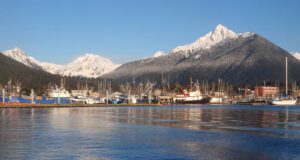
Fishery disaster determinations were approved by the U.S. Commerce Department in mid-December, with $300 million in disaster assistance for fishing families impacted by canceled crab and salmon harvests to be included in the final version of the FY 2023 Omnibus Appropriations Bill.
The eight fisheries approved include Alaska’s multi-million-dollar Bristol Bay red king crab and Bering Sea snow crab fisheries. Cancellation of the 2022-2023 Bering Sea snow crab, the 2022-2023 Bristol Bay red king crab, and the 2021-2022 Bristol Bay red king crab harvest resulted in an estimated $287.7 million loss to participants in those fisheries.
Confirmation of the disaster relief funds came from U.S. Senators Patty Murray, D-Wash., a senior member of the Senate Appropriations Committee, and Sen. Maria Cantwell, D-Wash., chair of the Senate Committee on Commerce, Science and Transportation.
The two signed on with Alaska Republican Senators Lisa Murkowski and Dan Sullivan in November in a letter urging Commerce Secretary Gina Raimondo to declare the disaster, which is required before the Commerce Department can begin distributing disaster funding.
“Families across Washington state rely on crab and salmon harvests to pay the bills and keep a roof over their heads,” said Murray, adding that she was working to pass an end-of year funding package for the benefit of harvests and small businesses that need those relief monies.
“This funding will support direct payments to fishing families, habitat restoration and the science needed to understand crab and salmon stock declines to help protect fishing jobs and our oceans in the future,” Cantwell added.
Also included in the disaster determination were the 2021 Alaska Kuskokwim River salmon, Norton Sound chum and coho salmon fisheries; the 2021 Chignik salmon fishery; the 2020-2021 Norton Sound red king crab fisheries; 2020 Washington ocean salmon fisheries; 2020 Copper River/Prince William Sound coho and pink salmon fisheries, and the 2019 Washington Columbia River, Willapa Bay and Puget Sound salmon fisheries.
Poor salmon returns for the 2019 Columbia River, Willapa Bay and Puget Sound fisheries resulted in a 37% loss to Washington’s statewide salmon fisheries, compared to the recent five-year average, data show.
In certain areas, fisheries saw reductions in salmon returns of over 65% of the five-year average, Murray and Cantwell said. Cancelation of the 2020 Washington ocean salmon fisheries, which impacted non-tribal ocean catch quotas for Chinook and coho salmon, resulted in revenue losses of 50% based on preliminary data, Murray and Cantwell said.
For the ocean salmon troll fishery, the total ex-vessel, or commercial value, was $1.1 million or 46% of the average from the previous five years.
All eight fisheries met specific requirements under the Magnuson-Stevens Fishery Conservation and Management Act and/or the Interjurisdictional Fisheries Act. These fisheries also could qualify for disaster assistance from the Small Business Administration.
In considering eligibility for disaster assistance, fisheries are subject to a number of factors that can cause sudden and unexpected losses, leading to serious economic impact for harvesters and their communities.
The final omnibus legislation also includes the Fishery Resource Disaster Improvement Act, which was reintroduced in March 2021. The bill would make improvements to NOAA’s Fishery Resource Disaster Relief program, part of the National Marine Fisheries Service, speeding up the process for tribes, fishing families and associated businesses to receive disaster relief.
